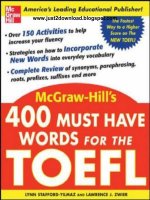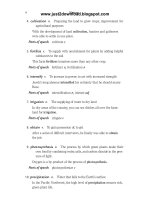Tài liệu 400 must have words for the toefl part 7 doc
Bạn đang xem bản rút gọn của tài liệu. Xem và tải ngay bản đầy đủ của tài liệu tại đây (559.59 KB, 10 trang )
4.
degrade v.
To reduce in value or strength
The roads in cold or wet areas of the United States degrade faster
than those in warm, sunny regions.
Parts of speech
degradation
n,
degradable
adj
5.
gap n.
Opening; a big difference in amount or quality
The small gap between the walls in the old house caused cold drafts
to come in.
6.
indisputable adj.
Beyond doubt; unquestionable
The members of the jury found her guilty because they found the
facts of the case indisputable.
Parts of speech
indisputably
adv
7.
intervene v.
To come between
A good mediator intervenes only as much as necessary to settle a
dispute between other parties.
Parts of speech
intervention
n
8.
intuitively adv.
By means of a natural sense about things that are hard
to observe
Many mothers know intuitively when something is wrong with their
children.
Parts of speech
intuition
n,
intuitive
adj
9.
recede v.
To move back or away from
After the age of 30, his hairline began to recede further back from
his forehead.
Parts of speech
recession
n,
recessive
adj
10.
retrieve v.
To bring or get back
Most dogs can be trained to retrieve objects that their owners have
thrown.
Parts of speech
retriever
n,
retrievable
adj
44
Mind and Body
www.just2download.blogspot.com
TOEFL Prep I
Find the word or phrase that is closest in meaning
to the opposite of each word in the left-hand column. Write the let-
ter in the blank.
1. degrade (a) stay out of a dispute
2. anomaly (b) improve
3. recede (c) questionable
4. intervene (d) the norm
5. indisputable (e) come forward
TOEFL Prep II
Circle the word that best completes each sentence.
1.
A huge (anomaly / gap) between the wealthy and the working class
often leads to social unrest.
2.
The new computers enable us to (intervene / retrieve) information
more quickly.
3.
Although she wasn’t qualified for the job, she (indisputably /
intuitively) felt that she should apply.
4.
When he joined the military, he did not expect the officers to
(degrade / recede) him.
5.
The art in the foyer was an important (acquisition / consciousness)
for the museum.
TOEFL Success
Read the passage to review the vocabulary you
have learned. Answer the question that follows.
Like other functions of the human mind, perception and memory are
imperfect. When we tell a story about something that we witnessed, we
may intuitively believe that our recollection is accurate. However, several
factors bias our memories of events.To study this anomaly, let us look at
the three steps of memory creation: acquisition of memory, storing of
memory, and retrieval. At every stage of memory formation, distortion can
occur. At the first stage, acquisition of memory, events are perceived and
bits of information are prepared for storage in the brain. However, it is
impossible for us to remember every single thing we observe. Through
processes that are both conscious and unconscious, people determine
which details they will focus on.
Memory
45
www.just2download.blogspot.com
In its second stage, storage, memories can become further distorted.
Over time, our memories degrade, as we forget portions of events. To
compensate, we may even creatively fill in the gap created by the
recession of long-term memory. Additionally, an individual’s memory can
be altered during the storage stage by intervening occurrences, which can
be subconsciously combined with previously stored
memories. Last but not least, we search our memory to locate
information. During recall, emotion also seems to play a part
in memory distortion. In sum, our memories may not be the
indisputable source of information that we would like them
to be.
An introductory sentence for a brief summary of the passage is provided
below. Complete the summary by selecting the three answer choices that
express the most important ideas in the passage. In each blank, write the
letter of one of your choices.
a.
People purposefully present a slanted version of events.
b.
Memories can be altered at any point in memory creation.
c.
People naturally cannot recall everything they observe.
d.
Memories are an indisputable source of fact.
e.
Time and emotion contribute to memory degradation.
f.
Past occurrences often displace current memories.
Lesson 9
Memory
TOEFL Prep I
1.
b
2.
d
3.
e
4.
a
5.
c
TOEFL Prep II
1.
gap
2.
retrieve
3.
intuitively
4.
degrade
5.
acquisition
TOEFL Success
b, c, e
Memory provides an imperfect record of events.
•
•
•
46
Mind and Body
Bonus Structure—
In sum means “to
summarize; to give
a short version of
what has been
stated.”
www.just2download.blogspot.com
LESSON
Spirituality
Target Words
1.
agnostic
6.
deify
2.
animism
7.
ecclesiastical
3.
atheist
8.
exalt
4.
be inclined to
9.
pious
5.
contemplate
10.
sacrifice
Definitions and Samples
1.
agnostic adj.
Believing that humans cannot know whether there is
a god
His devoutly Christian parents had problems with his agnostic beliefs.
Parts of speech
agnostic
n,
agnosticism
n
2.
animism n.
The belief that natural objects, such as trees, have souls
Desert cultures that practice animism often believe that winds con-
tain spirits.
Parts of speech
animistic
adj
3.
atheist n.
One who does not believe in the existence of a supreme being
He argued that his scientific training made it impossible for him to
be anything but an atheist.
Parts of speech
atheistic
adj
10
Copyright © 2005 by The McGraw-Hill Companies, Inc. Click here for terms of use.
www.just2download.blogspot.com
4.
be inclined to v.
To favor an opinion or a course of action
He couldn’t say which candidate he favored, but he had always
been inclined to vote Republican.
Parts of speech
incline
n,
inclination
n
5.
contemplate v.
To consider thoughtfully
If you contemplate each step for so long, we will never complete this
project on time.
Parts of speech
contemplation
n,
contemplative
adj
6.
deify v.
To worship as a god
When people deify the leader of their country, the leader is able to
abuse power more easily.
Parts of speech
deity
n
7.
ecclesiastical adj.
Relating to a church
He was looking specifically for a university where he could study
ecclesiastical history.
Parts of speech
ecclesiastic
n,
ecclesiastically
adv
8.
exalt v.
To praise or honor
He would often exalt the virtues of his new wife.
Parts of speech
exaltation
n
9.
pious adj.
Having or exhibiting religious reverence
Sometimes she was so pious that the rest of us felt like heathens.
Parts of speech
piousness
n,
piety
n,
piously
adv
10.
sacrifice v.
Anything offered to a deity as a religious thanksgiving;
giving up something in order to have something more valuable
later on
Every harvest time, the Fadeloni people sacrificed vegetables to
their gods as a show of thanks.
48
Mind and Body
www.just2download.blogspot.com









